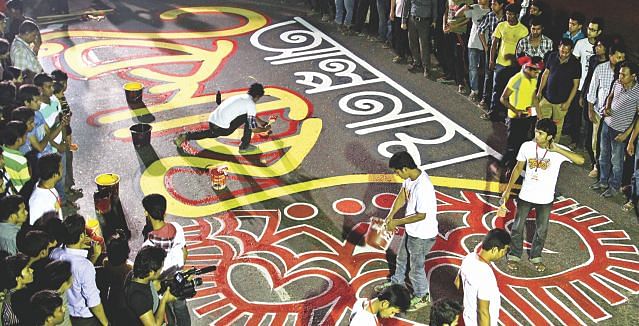Pahela Baishakh . . in all its radiance
 Motifs being painted on Manik Miah Avenue in the capital last night to celebrate Pahela Baishakh today, the first day of Bangla new year. The painting was supposed to go on all night. Bangla daily Prothom Alo, carrier Airtel and Berger Paint organised the event. Photo: Anisur Rahman
Motifs being painted on Manik Miah Avenue in the capital last night to celebrate Pahela Baishakh today, the first day of Bangla new year. The painting was supposed to go on all night. Bangla daily Prothom Alo, carrier Airtel and Berger Paint organised the event. Photo: Anisur Rahman
It is that time of year when Bangalees celebrate their heritage and, through that celebration, assess their place in the universal scheme of things. For Bangalees, like millions of others across the globe, have a claim on history based on the cultural tradition their ancestors shaped for them, one that they renew annually through Pahela Baishakh. There are the currents and cross-currents of history which have given Pahela Baishakh roundness of a throbbing sort. It is these underpinnings of the season, indeed the beginning of a new year, that Bangalees remember today. There is the essential point of reference that was Akbar. The Haal Khata, the closing off of a year just ended and the commencement of a new one, a taking stock of crops, indeed of productivity are the underpinnings we speak of.
There is, then, about Pahela Baishakh something of the pastoral. In that larger sense of the meaning -- and quite removed from the formalities attendant on its advent in these largely urban times -- it is the village, that timelessness of agrarian life that Pahela Baishakh recalls every year. There is a plenitude of colour, an abundance of music redolent of Pahela Baishakh. Add to that colour and to that melody the power of nature to remind the world of what it does or can do to make its presence felt yet once again.
In the lowing clouds hanging over the rustic fields, in the winds which sweep across the earth before flashes of lightning and ferocity of thunderclaps precede the fall of rain across the land comes that reminder of Baishakh being a particularly local affair for the people of this land as it is of the half of it that is today part of another land. Baishakh goes beyond the frontiers that demarcate the political realities which today define life in what once was one whole, unified Bengal.
And yet Pahela Baishakh brings all Bangalees -- here and over there and all across the Bangalee diaspora -- together in a spontaneous offering of homage to the land and to the natural elements that have kept it going for thousands of years. Baishakh is all that and much more. It is a symbolism of all the good Bangalees can claim for themselves through the poetry flowing from the minds of their greatest men. Rabindranath Tagore, Kazi Nazrul Islam, Dwijendra Lal Roy, Atulprasad and so many others have sung paeans to Bengal through the media of song and dance. Through the mysticism which defines faith, through the devotional songs of Lalon and Hason Raja, Pahela Baishakh rediscovers the aesthetics of life in these parts.
Yes, this morning it is truly a celebration of the past we lose ourselves in. Pahela Baishakh is all about losing oneself to reinvent oneself. The Bangalee spirit that has all so often been a hallmark of its politics and its poetry once more goes back to the magic inherent in its heritage to expand the cultural parameters of the future.
In Pahela Baishakh, there are all the intimations of rain about to be sprinkled on earth, of storms ready to blow, of the rainbow taking hold of the imagination. In the waterfall laughter of women is a lilt touching the soul, ever so softly. In the conversations of men are heard the stirrings of the flute which long ago coursed through the hamlets of this land and will be heard once again this morning.
On Pahela Baishakh, we celebrate ourselves. We celebrate all that is of us, that has been our ancestors' and that will be our children's.
Shubho Nababarsha!

 For all latest news, follow The Daily Star's Google News channel.
For all latest news, follow The Daily Star's Google News channel. 



Comments